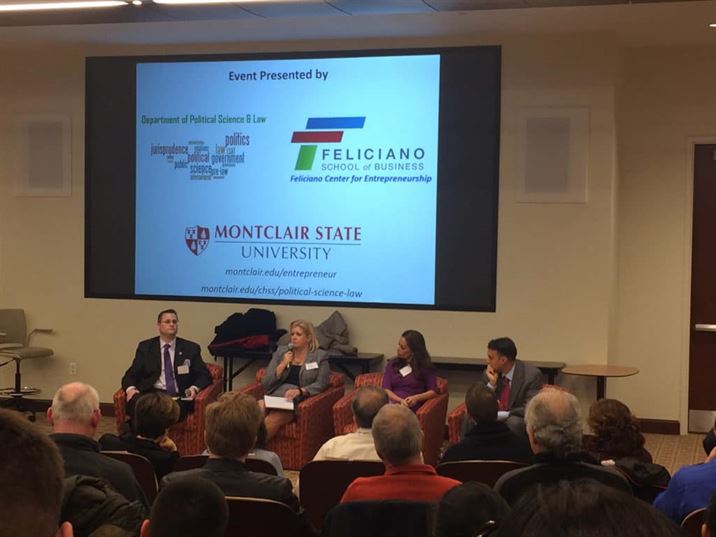
The panelists included David Postolski, Julie Roginsky, Michael Duhaime, and Brigid Callahan.
Photo Credit: Chanila German
Since taking the Oval Office on Jan. 20, President Donald Trump has started to make fast changes—some that have come as a surprise to the public. The world is watching in suspense to see what he will do next and how his changes will affect them. Entrepreneurs and small businesses owners are some of the many indiviuals that Trump’s changes can either dramatically improve or hurt.
After hearing the questions and concerns of students at Montclair State who hold a future in the business aspect of our nation, Gearheart Law partner David Postolski came up with an idea to create a panel to address them.
With the help of the business and political science departments, Postolski put together a panel with three other equally informed and educated individuals with a history in politics to discuss what Trump’s presidency will mean for innovation and entrepreneurship in his first hundred days in office.
At 7 p.m. on Monday night, Feliciano School of Business Room 101 was packed with people. Seats filled up with over 100 individuals who varied in ages. Many of the students stood off on the side or sat down on the stairs because of the lack of seats available.
Then the panelists were brought on stage. Postolski, the moderator, introduced Julie Roginsky, a Democratic political strategist and Fox News contributor, Michael Duhaime, a Republican political strategist and partner at Mercury, and Brigid Callahan, Montclair State’s professor in the political science department.
“We know that Donald Trump is a master…entrepreneur [and] brand strategist—for goodness sakes, he had a show, ‘Celebrity Apprentice,’ on television where he showed other people how to be the next entrepreneur. He’s a master distractor in business—how does that relate to how he could affect innovation and entrepreneurship in America?” Postolski asked, opening the discussion among the panelists.
“I will tell you that anyone [who] tells you how Trump’s administration is going to be on any specific field is lying to you. No one knows,” Callahan stated to the crowd. “We saw…in the election that many of the people that we trusted didn’t exactly know what they were talking about, and most of them got it wrong. And what we also know is that the master distractor will have positive consequences for some people in the new economy.”
Roginsky then weighed in: “The one thing that we can say with assurance about the Trump administration is that we actually don’t know what is going to happen. I don’t know about the rest of you, but the last ten days have been a mind-blowing philosophy, and I’m not sure if that is based on any [thing] other than that Donald Trump is a showman. He wants to keep people guessing. If you are an entrepreneur, you want some assurance on how the government will operate for the next four years.”
He continued, “I am not the businessperson in the room, but I suggest to the people [who] are: you do…need a sense of predictability if you’re going to invest. For example, you need to know that the people that you are going to hire…[will] gain entry into the United States with their work visas, and not be taken off the flight while arriving at John F. Kennedy Airport.”
A few disliked Roginsky’s comment on the recent situation with immigration, one woman in particular yelled, “Come on, come on,” in anger to show her disaproval.
Duhaime added, “By a business point of view, here you have a 70-year-old man that has spent his whole life coming up with new business ideas, does respect entrepreneurship, sees his peer groups as CEOs, and I think business leaders will have a great influence on him. He does not see senators, governors or members of Congress as his peer group, with the exception of a few that he is friends with, but for the most part, he sees politicians as people that can be bought and sold. I think that CEOs and major companies will have a huge influence on him.”
The other panelist nodded in agreement, and came to an agreement on what the future might hold, which is that it is unpredictable and only time will tell how it will affect the businesses.
Another thing that the panelists agreed on, is that they “had never met a 70-year-old man” that was willing to change. So if you are expecting Trump to change his tactics and strategies now that he is in the White House, none of the panelists see that occurring.



